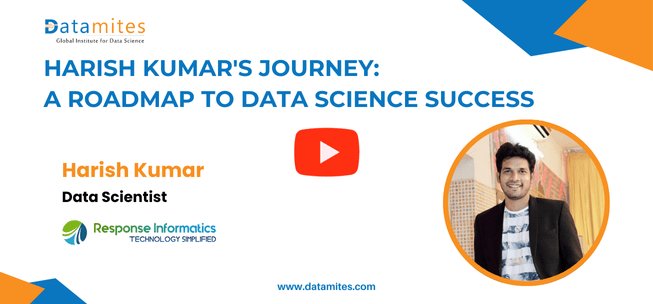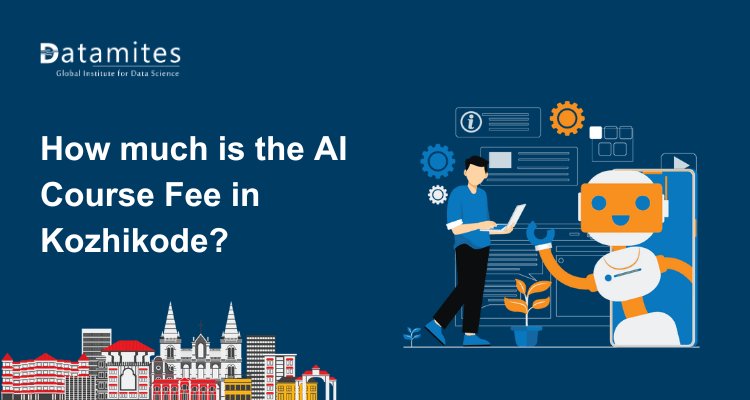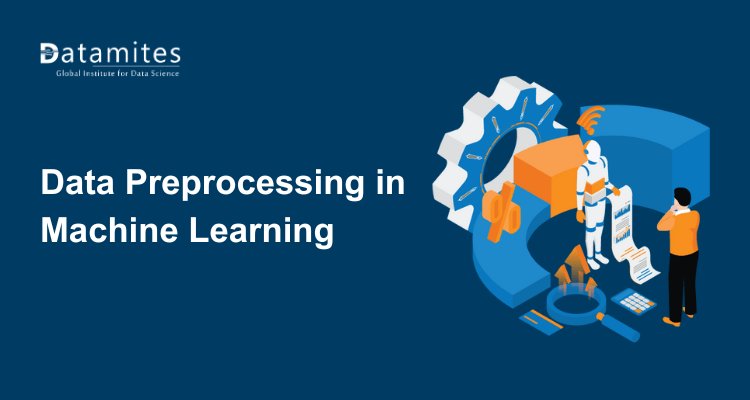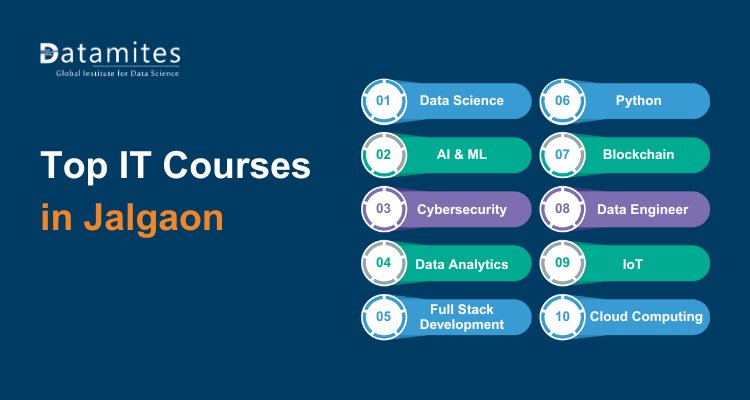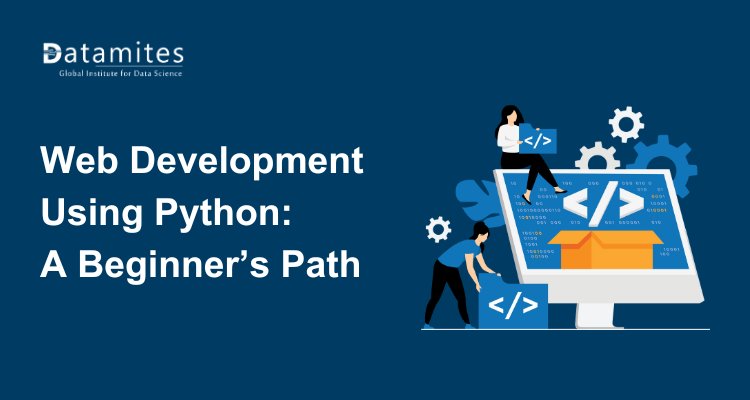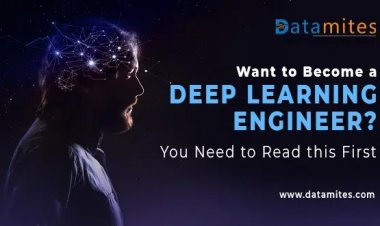Harish Kumar's Journey: A Roadmap to Data Science Success
Discover how Harish Kumar transitioned from a curious beginner to a successful data science professional. This inspiring roadmap outlines key steps, tools, and strategies he used along the way. Perfect for anyone looking to start or grow their data science career.
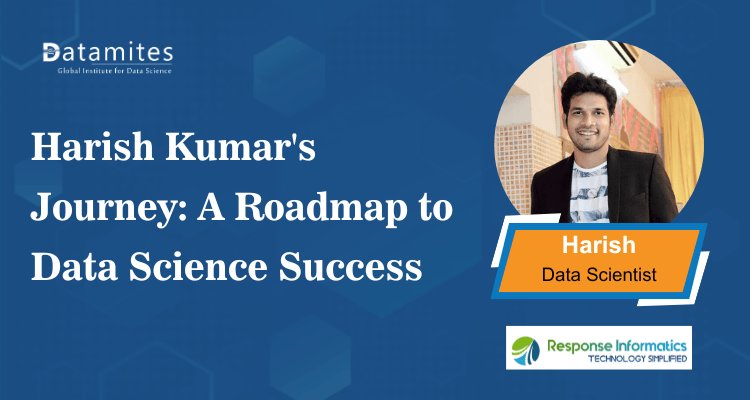
In today’s data-driven world, the demand for data science professionals has skyrocketed. As companies across industries look for individuals who can turn raw data into actionable insights, the field of data science has become one of the most sought-after career paths. The journey to success in data science is not always simple. It demands commitment, access to quality learning resources, and a clear, structured path.
One such roadmap is offered by Prasada Harish Kumar, a Data Scientist Associate at DataLabs AI Private Limited. In a recent webinar hosted by DataMites, Prasada shared his transformative journey into the world of data science, discussing the challenges he faced, how he overcame them, and the strategies he employed to secure his current role. His experience serves as a valuable source of inspiration for anyone looking to break into the field of data science.
Prasada Harish Kumar's Career Transition to Data Science: A Tale of Growth with DataMites
Prasada Harish Kumar’s journey highlights the power of structured learning, hands-on experience, and mentorship in successfully transitioning to a career in data science.
Q1: Can you tell us about your background and how you got started in the data science field?
I have a background in engineering, having completed my degree at Avanti Institute of Engineering & Technology. Initially, I was unsure about my career direction, and like many others, I started in a different field. However, I soon realized that I had a deep interest in working with data, solving problems, and using technology to create insights. This curiosity prompted me to dive into the field of data science.
My journey started with a lot of self-study. I took online courses, read books, and tried to implement what I was learning on small projects. But I quickly realized that to truly excel, I needed more structured learning and hands-on experience. That’s when I decided to enroll in a comprehensive data science program with DataMites Institute, which provided me with the knowledge and skills I needed to move forward.
Q2: What were the challenges you faced while transitioning into data science?
The biggest challenge I faced was the career gap I had before pursuing data science. I was initially working in a different industry, and when I decided to switch careers, I had no prior experience in data science. This gap made it difficult to break into the field, and I struggled with self-doubt.
Another challenge was mastering the multitude of tools and technologies required for data science. Learning data science goes beyond mastering programming languages like Python or R. It also involves gaining proficiency in data wrangling, understanding machine learning algorithms, statistics, and visualization methods. The vastness of the field can feel overwhelming at times, but I learned that consistency and persistence are key.
Q3: How did you overcome these challenges and transition into a successful career in data science?
I started by enrolling in a structured data science program at DataMites, which provided a clear learning roadmap and a strong foundation. The curriculum combined theory and practical skills, boosting my confidence. I also worked on real-world projects to gain hands-on experience and showcase my skills. Additionally, DataMites' placement assistance and mentorship played a key role in securing my current job.
Q4: What resources and learning methods did you find most effective in mastering data science?
I believe in a mix of learning methods. The formal training I received through DataMites was essential for building a solid foundation. However, I also relied on supplementary resources like online courses from platforms such as Coursera and edX. These platforms offer specialized courses on topics like machine learning and deep learning, which helped me dive deeper into specific areas of data science.
In addition to formal education, I spent a lot of time working on personal projects. These projects allowed me to apply what I was learning in a real-world context and helped me build a portfolio. I also joined online communities and forums like Stack Overflow and GitHub, where I could collaborate with others, ask questions, and learn from experienced data scientists.
Q5: What advice would you give to aspiring data scientists who are just starting out?
My first piece of advice is to continuously learn. Data science is a constantly changing field, and staying updated with the latest technologies, tools, and methods is essential. It can be overwhelming at times, but consistency is key. Try to learn something new every day, even if it’s just a small concept.
Secondly, focus on completing as many hands-on projects as you can. Simply understanding the theory isn't enough; it's essential to apply your knowledge to tackle real-world challenges. Building a strong portfolio of projects will demonstrate your abilities to potential employers.
Lastly, don’t be afraid to ask for help. The data science community is vast and incredibly collaborative. If you’re stuck on something, reach out to others on forums or LinkedIn. Gaining insights from others is an excellent way to advance in this field.
Q6: How did your education play a role in your data science journey?
My engineering education provided a strong analytical foundation, which helped me in areas like problem-solving, logical thinking, and understanding complex systems. However, data science requires a unique set of skills that go beyond traditional engineering, such as programming, statistical modeling, and machine learning. My decision to pursue a specialized data science course was essential in bridging that gap.
Q7: Did you face any challenges with the programming side of data science?
Yes, initially, programming was a challenge for me, especially when I was learning Python and R. But what helped was understanding that programming is a tool to solve problems. I concentrated on creating small projects that involved programming, which helped make the learning process more hands-on and practical. Over time, I became more comfortable with coding, and now it feels like second nature.
Q8: How important is networking and community involvement in data science?
Networking has been crucial in my journey. I’ve attended webinars, joined LinkedIn groups, and connected with other data science professionals. These connections have helped me learn about new job opportunities, stay updated on industry trends, and gain insights from more experienced professionals.
Being part of the data science community provides constant learning opportunities and helps in staying motivated. It’s important to surround yourself with people who share the same passion.
Q9: What role did DataMites play in your career progression?
DataMites was pivotal in shaping my career progression. The training I received helped me build the core skills needed for data science. Additionally, the placement assistance and guidance from mentors were invaluable in securing my current role. They provided career counseling, interview preparation, and support, which made my transition into data science much smoother.
Q10: What are the key skills a data scientist needs to possess?
The key skills for a data scientist include:
- Strong knowledge of programming languages like Python and R
- Expertise in statistics and data analysis techniques
- Experience with machine learning algorithms and tools
- Data wrangling and preprocessing skills
- Data visualization capabilities
- Communication skills to present insights effectively to non-technical stakeholders
Q11: How do you keep yourself updated with the latest trends in data science?
I regularly read research papers, blogs, and articles on platforms like Medium, Towards Data Science, and Arxiv. I also follow industry leaders on social media and participate in webinars and online courses to stay updated with the latest advancements.
Q12: What’s the best way to build a portfolio that stands out to employers?
Building a portfolio is about showcasing your ability to solve real-world problems. Start with projects that are meaningful to you, such as analyzing public datasets, creating machine learning models, or building data-driven applications. Make sure to document your work thoroughly on GitHub and provide clear explanations of the problem, approach, and results.
Q13: How do you handle setbacks or failures in your data science journey?
Setbacks are part of the learning process. Whenever I face failure, I take it as a learning opportunity. I try to analyze what went wrong, revise my approach, and keep moving forward. Persistence and learning from mistakes are key to growing as a data scientist.
Q14: How do you balance the theoretical and practical aspects of data science?
I believe both are equally important. Theoretical knowledge gives you the foundation to understand concepts, while practical experience allows you to apply them. I made sure to apply what I learned through projects as soon as possible to reinforce the concepts and bridge the gap between theory and practice.
Q15: Can you share a memorable success story from your data science career?
One of the most memorable moments was when I successfully built a predictive model for a client that helped them optimize their supply chain. The model provided actionable insights that led to significant cost savings for the company. Seeing the real-world impact of my work was incredibly rewarding.
Refer these articles:
- From Non-Tech to Data Science: Pavan's Career Transition
- Shivaji's Transition from Mechanical Engineering to Data Science
- Manohar’s Journey: From Mechanical Engineer to Data Scientist
Key Points from Prasada Harish Kumar’s Data Science Journey
Here are the top highlights that capture Prasada’s inspiring transition into the world of data science:
- Career Transition Is Achievable: Successfully moved from a non-data background into data science through structured learning.
- Enrolled in a Structured Program: Joined DataMites to gain a comprehensive and guided learning experience.
- Focused on Hands-On Projects: Built real-world projects that helped him apply concepts and gain practical experience.
- Mastered Core Tools: Learned essential tools like Python, SQL, Pandas, and Scikit-learn.
- Built a Strong Portfolio: Showcased his projects on GitHub to demonstrate skills to potential employers.
- Received Mentorship and Guidance: Benefited from expert mentorship that helped him stay focused and motivated.
- Leveraged Networking: Actively networked through LinkedIn and webinars to explore job opportunities and industry insights.
- Developed Soft Skills: Emphasized communication and problem-solving, key traits for data science roles.
- Committed to Continuous Learning: Stays updated with the latest trends via blogs, online courses, and community engagement.
- Utilized Career Support from DataMites: Took advantage of placement assistance, resume building, and mock interviews to land a job.
Prasada Harish Kumar’s transformation into a data science professional is a powerful reminder that with the right mindset and approach, anyone can pivot into this exciting field. His journey underscores the value of structured education, consistent hands-on practice, and a growth-oriented attitude. For beginners, his message is clear: embrace the learning curve, engage in real-world projects, and don't hesitate to seek guidance along the way.
Refer these articles:
- Why Data Scientist Career in Chennai
- Why Data Scientist Career in Bangalore
- Why Data Scientist Career in Delhi
Now is one of the best times to enter the world of data science. According to a Grand View Research report, the global data science platform market reached USD 96.25 billion in 2023 and is forecasted to grow at a CAGR of 26.0% between 2024 and 2030. This surge is driven by the explosive rise in digital data, creating abundant opportunities for skilled data professionals. To make the most of this momentum, it’s crucial to choose a training provider that offers practical exposure, industry projects, internships, and job placement support. Give your career a powerful boost by enrolling in data science training in Chennai, Bangalore, Hyderabad, Pune, Mumbai, and Delhi—cities known for offering some of the best learning opportunities in the field.
Among the top institutes, DataMites has earned a reputation for excellence in training across Data Science, Artificial Intelligence, Machine Learning, Python, and Data Analytics. Accredited by IABAC and NASSCOM FutureSkills, DataMites provides a comprehensive learning experience with expert mentors, hands-on projects, and strong placement support, helping learners smoothly transition into data science roles.
With data science online training in Bangalore, Chennai, Hyderabad, Pune, Ahmedabad, Coimbatore, and Mumbai, and flexible online options, DataMites ensures accessibility and convenience for learners across India. Their focus on practical, industry-relevant skills equips fresh graduates, working professionals, and career changers to excel in today’s data-driven economy.
While the journey into data science may come with its challenges, success is achievable with persistence, the right support, and a clear direction. As Prasada Harish Kumar’s story illustrates, with dedication and the right guidance, anyone can carve a successful path in data science—turning aspiration into achievement.
